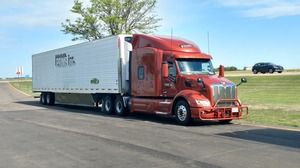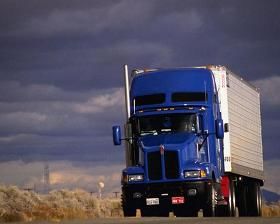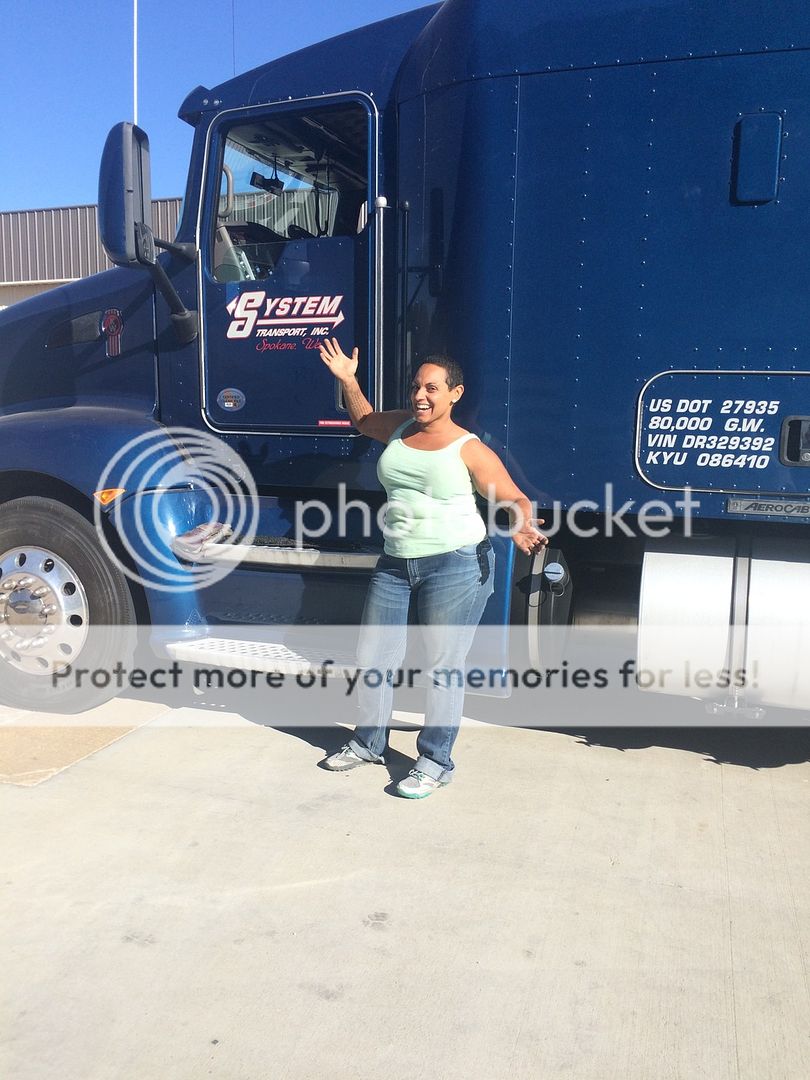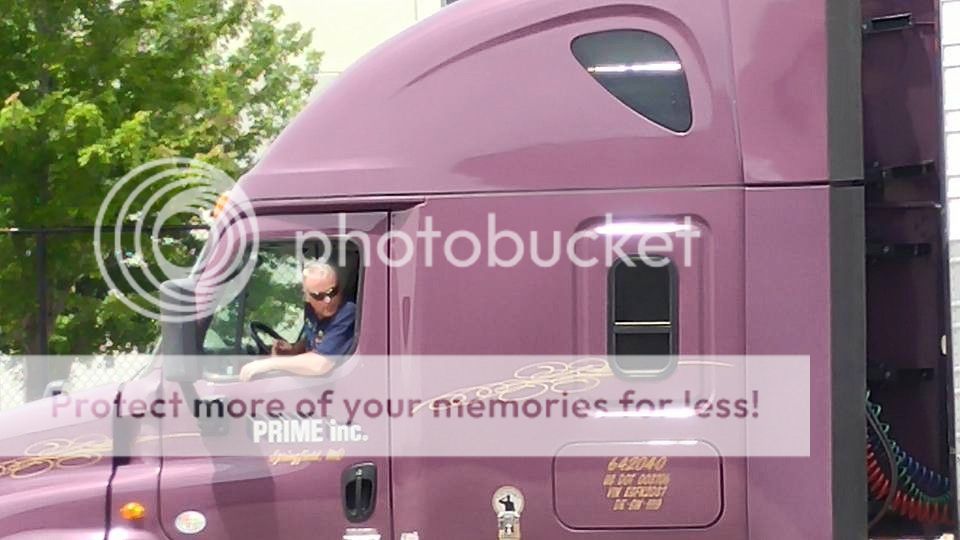Need Some Guidance And Clarification, Just Getting Started
Topic 8633 | Page 1

Hello!
I'm interested in driving truck but don't really know where to get started and with what company. I have started reading my state's CDL manual, but I seem to be faced with two options that I'm not sure from which to pick: Go to school (which I don't have $ up front for)? Or get on with a company that offers paid training? The signing bonuses seem too good to be true and I don't want to fall for a scam.
Also, I understand that I'll have to drive OTR for about a year before any local company will consider hiring me (correct?), but I'm not sure which companies are good companies to go with for paid training. Any suggestions? I've heard of two to stay away from, but I thought it best to get some feedback from a larger audience. So here I am!
I also need some help with industry terminology so I make a solid decision. A friend of mine drives for a local food company and warned me (in the most polite way possible) to be careful of getting into carrying loads that I wouldn't be able to deliver. Meaning: I'm 5' tall and he throws product from the back of his trailer which he has to reach at his 6' 8" chest. There's no way I'd be able to throw product consistently at that height (without scaffolding ;) ) so I was wondering about ?"drop and hook"? positions? And that's where my terminology is limited. I have no problem accepting that due to my height, I might not physically be able to do some jobs, but what positions should I keep my eyes out for?
Thanks for taking the time to read my extremely long post and for your feedback. I just want to make solid decisions and get on a good path!
Welcome to the TT forum.
Have you checked out some of the resources here, like the Truck Driver's Career Guide,Truck Driving Schools,High Road Training Program?
As far as going with a company paid program or paying for a driving school really is a personal choice. I myself went through Prime for my training and can say from personal experience that it worked well for me. You will find that most company sponsored schools are very fast paced compared to paid schooling (at least that is what I hear from others here on the forum that have done paid schooling).
It is not set in stone when it comes to having to do OTR before you can get a local driving gig, it is just most of the time you will find local companies want at least 6 months to a year of OTR experience (not to say that is always true either).
You will find most OTR companies have what is called "no touch freight", meaning you do not have to load/unload (for the most part). You will find this mostly true with most reefer companies and a lot of the dry van positions as well.
As for drop/hook, that means you drop your trailer you pulled into the shipper/receiver with and pick up a loaded/empty trailer and keep moving without having to wait to get loaded/unloaded.
Any other questions, let us know and we will help if we can. There are lots of other folks here that are willing to help with any questions you have.
Ernie
CDL:
Commercial Driver's License (CDL)
A CDL is required to drive any of the following vehicles:
- Any combination of vehicles with a gross combined weight rating (GCWR) of 26,001 or more pounds, providing the gross vehicle weight rating (GVWR) of the vehicle being towed is in excess of 10,000 pounds.
- Any single vehicle with a GVWR of 26,001 or more pounds, or any such vehicle towing another not in excess of 10,000 pounds.
- Any vehicle, regardless of size, designed to transport 16 or more persons, including the driver.
- Any vehicle required by federal regulations to be placarded while transporting hazardous materials.
Shipper:
The customer who is shipping the freight. This is where the driver will pick up a load and then deliver it to the receiver or consignee.
OTR:
Over The Road
OTR driving normally means you'll be hauling freight to various customers throughout your company's hauling region. It often entails being gone from home for two to three weeks at a time.
Dry Van:
A trailer or truck that that requires no special attention, such as refrigeration, that hauls regular palletted, boxed, or floor-loaded freight. The most common type of trailer in trucking.Reefer:
A refrigerated trailer.
Drop And Hook:
Drop and hook means the driver will drop one trailer and hook to another one.
In order to speed up the pickup and delivery process a driver may be instructed to drop their empty trailer and hook to one that is already loaded, or drop their loaded trailer and hook to one that is already empty. That way the driver will not have to wait for a trailer to be loaded or unloaded.

Most unload customers are store stops like dollar general, dollar tree, etc. And generally are dedicated accounts.
With no-touch freight and drop/hook type business, the most strenuous thing you'll probably have to do is to crank the landing gear.
Most cranks even have a 10x gear-down. 10 times easier, and takes 10 times longer. (Note: when the cranking starts to get easy, you switch to "regular" to finish up.)

Thanks so much for the responses and for the clarification. After posting, I did look through some of the mentioned resources (and immediate felt silly asking about things that were clearly stated in them). I'll look into Prime and thank you for the referral. I'm also going to try to get a few of the pre-hire letters.
Thanks again for the warm welcome and any further advice anyone has is always appreciated.
Pre-hire:
What Exactly Is A Pre-Hire Letter?
Pre-hire letters are acceptance letters from trucking companies to students, or even potential students, to verify placement. The trucking companies are saying in writing that the student, or potential student, appears to meet the company's minimum hiring requirements and is welcome to attend their orientation at the company’s expense once he or she graduates from truck driving school and has their CDL in hand.
We have an excellent article that will help you Understand The Pre-Hire Process.
A Pre-Hire Letter Is Not A Guarantee Of Employment
The people that receive a pre-hire letter are people who meet the company's minimum hiring requirements, but it is not an employment contract. It is an invitation to orientation, and the orientation itself is a prerequisite to employment.
During the orientation you will get a physical, drug screen, and background check done. These and other qualifications must be met before someone in orientation is officially hired.

Thanks so much for the responses and for the clarification. After posting, I did look through some of the mentioned resources (and immediate felt silly asking about things that were clearly stated in them). I'll look into Prime and thank you for the referral. I'm also going to try to get a few of the pre-hire letters.
Thanks again for the warm welcome and any further advice anyone has is always appreciated.
Good luck Melly, Im going with Prime. I leave for training next Saturday or Sunday. From what I've read they put allot into training and the pay looks good. I already passed my written test. I went thru the High Road program on this site and only got 2 wrong on my test of around 100 questions. High Road made the test easy. Maybe see you at Prime.... Rick O
Pre-hire:
What Exactly Is A Pre-Hire Letter?
Pre-hire letters are acceptance letters from trucking companies to students, or even potential students, to verify placement. The trucking companies are saying in writing that the student, or potential student, appears to meet the company's minimum hiring requirements and is welcome to attend their orientation at the company’s expense once he or she graduates from truck driving school and has their CDL in hand.
We have an excellent article that will help you Understand The Pre-Hire Process.
A Pre-Hire Letter Is Not A Guarantee Of Employment
The people that receive a pre-hire letter are people who meet the company's minimum hiring requirements, but it is not an employment contract. It is an invitation to orientation, and the orientation itself is a prerequisite to employment.
During the orientation you will get a physical, drug screen, and background check done. These and other qualifications must be met before someone in orientation is officially hired.

Thanks Rick! And good luck to you too. I scanned the Prime website and I'd have to do a little more digging. Looks like they're based out of MO and I'm in CO. Just need to find out if they are one of the companies that would require me to relocate.

Thanks Rick! And good luck to you too. I scanned the Prime website and I'd have to do a little more digging. Looks like they're based out of MO and I'm in CO. Just need to find out if they are one of the companies that would require me to relocate.
Melly,
No, you will not have to relocate. They have a drop yard in Denver. I have a friend of mine that drives for Prime that lives in Montrose CO.
Ernie
New Reply:
New! Check out our help videos for a better understanding of our forum features

















Preview:








 TT On Facebook
TT On Facebook
Hello!
I'm interested in driving truck but don't really know where to get started and with what company. I have started reading my state's CDL manual, but I seem to be faced with two options that I'm not sure from which to pick: Go to school (which I don't have $ up front for)? Or get on with a company that offers paid training? The signing bonuses seem too good to be true and I don't want to fall for a scam.
Also, I understand that I'll have to drive OTR for about a year before any local company will consider hiring me (correct?), but I'm not sure which companies are good companies to go with for paid training. Any suggestions? I've heard of two to stay away from, but I thought it best to get some feedback from a larger audience. So here I am!
I also need some help with industry terminology so I make a solid decision. A friend of mine drives for a local food company and warned me (in the most polite way possible) to be careful of getting into carrying loads that I wouldn't be able to deliver. Meaning: I'm 5' tall and he throws product from the back of his trailer which he has to reach at his 6' 8" chest. There's no way I'd be able to throw product consistently at that height (without scaffolding ;) ) so I was wondering about ?"drop and hook"? positions? And that's where my terminology is limited. I have no problem accepting that due to my height, I might not physically be able to do some jobs, but what positions should I keep my eyes out for?
Thanks for taking the time to read my extremely long post and for your feedback. I just want to make solid decisions and get on a good path!
CDL:
Commercial Driver's License (CDL)
A CDL is required to drive any of the following vehicles:
OTR:
Over The Road
OTR driving normally means you'll be hauling freight to various customers throughout your company's hauling region. It often entails being gone from home for two to three weeks at a time.
Drop And Hook:
Drop and hook means the driver will drop one trailer and hook to another one.
In order to speed up the pickup and delivery process a driver may be instructed to drop their empty trailer and hook to one that is already loaded, or drop their loaded trailer and hook to one that is already empty. That way the driver will not have to wait for a trailer to be loaded or unloaded.